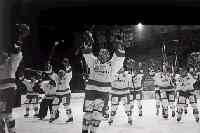A documentary on an ice hockey team may not sound the most thrilling of possible films. Pepe Danquart's Heimspiel (Home Game, 1999), however, transforms the subject into a magical cinematic work of balletic beauty with insights into the split between east and west Germany and the political absurdities of the old German Democratic Republic (GDR). Even the most hardened haters of sport, and I count myself in such a category, cannot fail to be wooed by Heimspiel.
The documentary's theme is the east German ice hockey team Eisbären and the "story" takes place over one season, ten years after the fall of the Berlin Wall and is constructed from interviews with players, managers, fans, and journalists. But most impressive are the ice hockey sequences themselves.
Sport as art
The opening shots of the film show extreme close-ups of ice hockey players putting on their gear accompanied by the sound of limbs and kit being taped up and heavy base music. The camera cuts back and forth between scenes of the players preparing and the mounting tension of the fans. By the time the game was about to start, I too felt the need to swing my scarf in time to the Eisbären's team song.
Exhilarating action shots of the players on the ice were achieved by strapping cameras to them. The sound of the skates steering and scraping along the ice, and the protracted use of slow-motion, complete the transfiguration of ice hockey from a simple sport into a refined art form.
At a press conference at the Berlin Film Festival, Danquart - who won an Oscar in 1994 for his short film Schwarzfahrer (Fare-dodger) - said that the film took two years in total to shoot, giving him a total of 33 hours of footage to edit. It is within the editing that the real genius of this documentary lies. Its sharp cuts join all those linked to the ice hockey game together in such a way that the connection between these people is never lost. And what connects them is a real passion for the game.
Sport as politics
During the years of the GDR, the government ceased to fund ice hockey and so only two teams remained in the country. They were not permitted to travel abroad; thus they were doomed to play each other ad infinitum. The observant and genial ice hockey journalist who is interviewed throughout the documentary comments that the players "even knew each other's shoelaces."
Today the fans and players often play in the West and some fans follow them. Many choose to stay at home and complain that they are still treated as second class citizens when they are in the West. They prefer the atmosphere of conviviality on their home turf.
When Danquart initially met with these fans he encountered resistance from them, as they had previously been represented as hooligans. The final product shows that they must certainly have trusted him by the end. Some shots of them are so close and heart-warming, that their joyous faces fill up the entire screen. One of them heartily confides to the camera how thrilled he is that their club has survived "so we don't have to go bowling."
It is true that, despite the high plane Danquart elevates ice hockey to, 101 minutes is a little too much for those who are not hard-core ice hockey fans. But Heimspiel shows that documentaries can have exciting cinematic potential and restores faith that a real community spirit is possible in this age of an atomised society.
Elke de Wit, 24 April 2000
Rolf Schübel's Ein Lied von Liebe und Tod |
Rosa von Praunheim's Der Einstein des Sex |
Andreas Kleinert's Wege in die Nacht |
Veit Helmer's Tuvalu |
Sebastian Schipper's Absolute Giganten |
Frieder Schlaich's Otomo |
Bernd Eichinger's Der Große Bagarozy |
Thorsten Schmidt's Schnee In Der Neujahrsnacht |
Doris Dörrie's Erleuchtung Garantiert |
Leander Haußmann's Sonnenallee |
Maren-Kea Freese's Zoe |
Click here for the Berlinale website |
Moving on:
- Return to the CER front page
- For more articles on Central and East European film see the Kinoeye Archive



